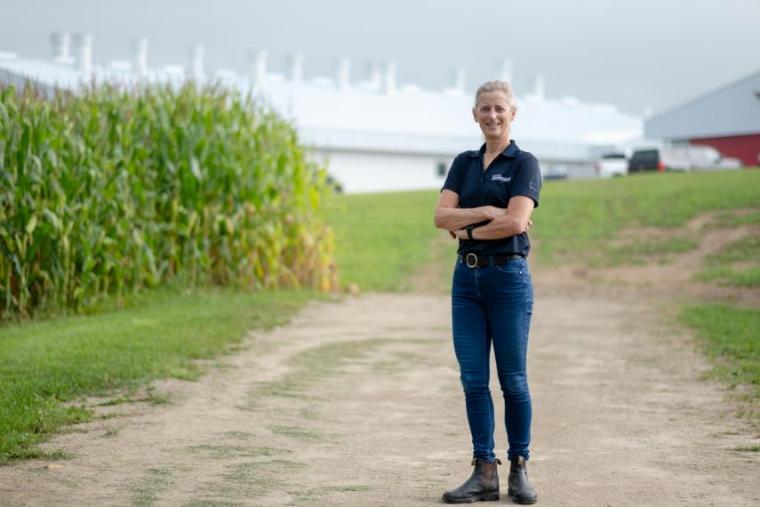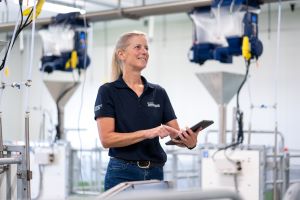Sector impact
This research will inform on-farm production practices related to piglet processing, supporting 997 producers and Ontario’s $3.78-billion pork industry.

Dr. Terri O’Sullivan believes swine farms are missing an opportunity for using needle-free injection technology in young piglets. The technology – with potential economic benefits for producers and welfare benefits for animals – has been available for some time but has not been widely adopted in Ontario hog production.
![]()
This research will inform on-farm production practices related to piglet processing, supporting 997 producers and Ontario’s $3.78-billion pork industry.
“As an industry, I think it’s important to always be evaluating and re-evaluating technologies like needle-free injection to see if there are ways we can improve piglet processing and other practices,” says O’Sullivan, a faculty member in the swine department [1] within the University of Guelph’s Department of Population Medicine at the Ontario Veterinary College.
O’Sullivan and colleague Dr. Ron Johnson are examining ways to reduce needle use on farm, specifically by using a needle-free injection device (NFID) to administer iron and meloxicam, a non-steroidal anti-inflammatory drug (NSAID), to young piglets at processing/castration within the first four days of life. They hope to generate evidence-based data to support the use of the technology that will help promote uptake and greater adoption of NFID technology on farms.

Needle-free injector devices administer products intradermally (within the skin) using compressed air. Eliminating needles may make treatment less painful for the animal.
In her new research project, O’Sullivan will evaluate the use of NFID to administer both iron and NSAIDs.
For the iron component of the project, she will compare administering of the element using the needle-free technology with a traditional needle and syringe by evaluating piglet reaction and welfare indicators.
“I’m really excited to be doing this study at the new Ontario Swine Research Centre in Elora [2],” says O’Sullivan, referring to a new facility opened in late August. “The design of the farrowing rooms will make it a great space to do research when you factor in animal care needs, extra room for research equipment, the options for evaluating piglets by video or live observation and using it as a teaching space for DVM students.”
After the sow herd moves into the new centre, O’Sullivan and her team will begin evaluating more than 700 piglets in January 2024. “The new location in Elora provides a great space to do high-quality research in a high-quality facility.”
The meloxicam component of her project will compare how well the drug is absorbed, distributed and eliminated in the piglet when administered with the needle-free technology compared to administration by a needle and syringe.
“We know that when meloxicam is absorbed, piglets receive an analgesic [pain-relieving] benefit at castration, so we want to evaluate how effective the needle-free technology is at ensuring the product is adequately absorbed to have the desired effect on the piglet,” says O’Sullivan. This study started this fall and takes place at the University of Guelph.
An equally important part of this research for O’Sullivan is sharing new knowledge. “My focus is mainly on applied research related to the swine industry and I’m really interested in engaging with producers and the industry about the use and potential for greater adoption of needle-free technology.” She plans to talk to producers to learn about and address barriers to wider use of this technology.
“My big, lofty goal with this work is that if we demonstrate the value of needle-free injection technology in young piglets at processing, perhaps we can increase uptake on farm and then create a domino effect for using NFID in older pigs, too,” says O’Sullivan.
This research is funded by the Ontario Agri-Food Innovation Alliance, a collaboration between the Ontario Ministry of Agriculture, Food and Rural Affairs and the University of Guelph. Additional funding is provided by Ontario Pork and the Canadian Global Food Animal Residue Avoidance Data Bank.
The NFID study on iron and NSAID administration will take place at the Ontario Swine Research Centre [2], which is owned by the Agricultural Research Institute of Ontario and managed by the University of Guelph through the Ontario Agri-Food Innovation Alliance.